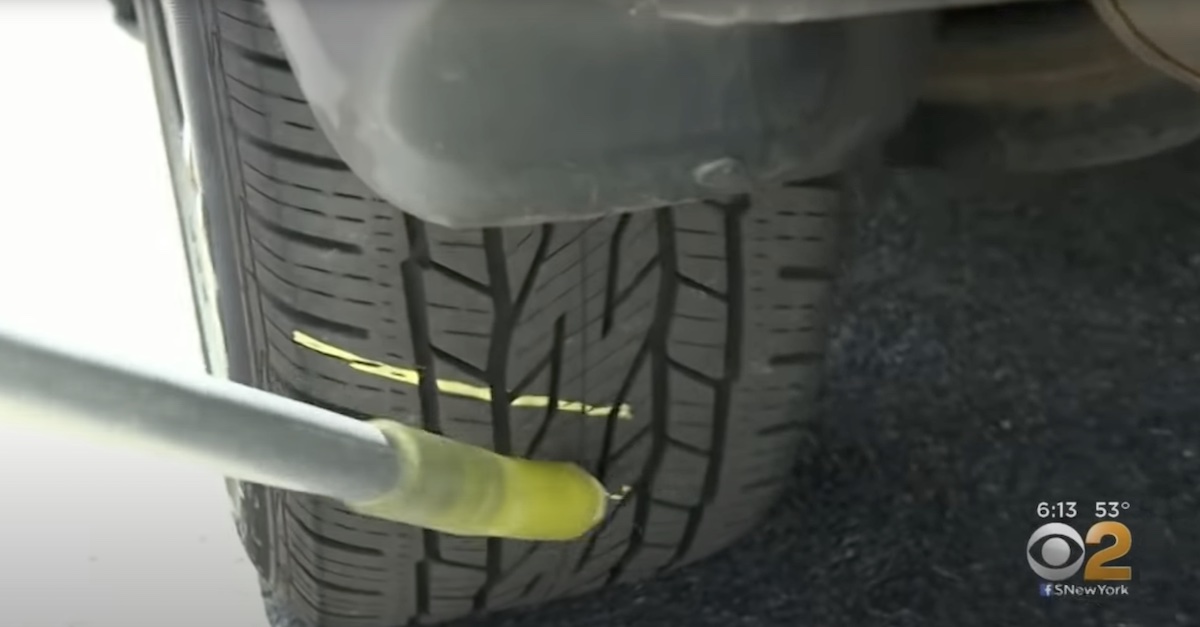
A woman who fought her parking tickets in a class-action case all the way up to the U.S. Court of Appeals for the Sixth Circuit was vindicated by a lower court on Monday, which recognized the parking police practice of “chalking tires” as an unconstitutional “search” in violation of the Fourth Amendment.
The ruling in favor of Alison P. Taylor and against the City of Saginaw, Michigan was also a ruling in favor of the similarly situated, noted U.S. District Judge Thomas Ludington.
Unfortunately for class-action plaintiffs, the judgment closing the case ordered the city to pay only nominal damages in the amount of $1 per chalking violation:
It is DECLARED under the Declaratory Judgment Act, 28 U.S.C. § 2201, and Federal Rule of Civil Procedure 57, that Defendant’s practice of marking vehicle tires with chalk without a warrant or individualized suspicion of wrongdoing is UNCONSTITUTIONAL under the Fourth Amendment to the United States Constitution.
Further, it is ORDERED that Defendants are DIRECTED to pay forthwith nominal damages of $1.00 to each member of the subclass, as defined in Taylor v. City of Saginaw, No. 1:17-CV-11067, 2022 WL 202999, at *1–2 (E.D. Mich. Jan. 21, 2022), for each time that Defendants marked such members’ vehicles with chalk.
The case arose five years ago after Taylor received several parking tickets for exceeding the downtown time limit. Each ticket noted that Taylor’s vehicle had been marked with chalk and some included photographs.
Taylor filed a civil rights lawsuit under 42 U.S.C. § 1983, alleging that Tabitha Hoskins (the parking officer who issued the tickets) violated Taylor’s Fourth Amendment rights on the grounds that chalking constituted an unreasonable search or seizure.
The three-judge panel of the Sixth Circuit, which included Circuit Judges Joan Larsen and John Nalbandian (both Donald Trump appointees) and Richard Griffin (a George W. Bush appointee) ruled in Taylor’s favor. Writing for the panel, Judge Griffin reasoned that “[b]ecause tire chalking is a search that defendants conducted without an authorizing warrant, it is presumptively unreasonable.”
Judge Ludington, also a Bush appointee, referenced the Sixth Circuit’s decision and a Justice Antonin Scalia quote in the opening lines of his opinion [some citations removed]:
When “[t]he Government physically occupie[s] private property for the purpose of obtaining information,” it conducts “a search within the meaning of the Fourth Amendment.” In 2012, the Supreme Court applied this principle to the placement of a tracking device on a vehicle’s undercarriage. Seven years later, the Sixth Circuit extended the principle to instances in which cities apply chalk to vehicles’ tires to track violations of parking ordinances. In both cases, the harmlessness of the intrusion was irrelevant. As Justice Scalia wrote, when a man “set[s] his foot upon his neighbor’s close without his leave,” he trespasses, even “[if] he does no damage at all.” See Jones, 565 U.S. at 405 (quoting Entick v. Carrington, 95 Eng. Rep. 807, 817 (C.P. 1765) (emphasis added)).
The judge, rejecting defendants’ argument that no warrant was needed because no damage was done by chalking tires, declared the practice unconstitutional.
“As a result, Defendants’ practice of suspicion-less chalking will be declared unconstitutional, and they will be ordered to pay nominal damages for each instance of chalking. Plaintiff’s additional requests for a permanent injunction and refunds of parking tickets, however, will be denied,” the judge ruled.
Read the opinion:
The Sixth Circuit ruling is below:
Elura Nanos contributed to this report.
[Image via CBS New York screengrab]